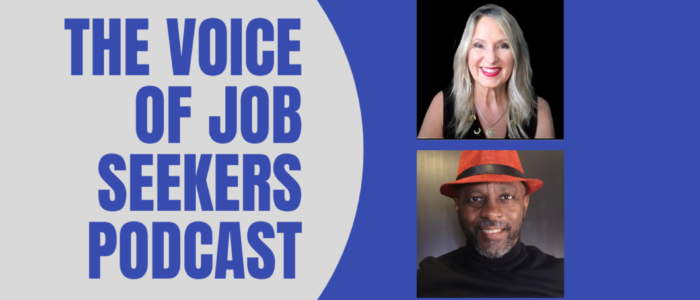
Podcast: Play in new window | Download | Embed
Subscribe: Apple Podcasts | RSS
Companies want qualified people to do the job, and stories that combine the company’s heartbeat with the unique narratives of the candidates win.
This is the most robust resume discussion I’ve had in the 12+ years of this podcast.
In this episode, we discuss trends in resume writing, which help you write more purposefully, tell a story, and move employers to call you. More resume writers and career professionals, including myself and my guest, Jacqui Barrett-Poindexter, advise your resume, along with your LinkedIn profile, tell a complete story. We discuss storytelling everywhere, the importance of focus, and social media.
Do your resume and social profiles tell a story that helps your knowledge, skills, and abilities stand out? Here are three ways to provide feedback:
- Call and leave a voicemail at 708.365.9822
- Email: mark@thevoiceofjobseekers.com
- Go to TheVoiceofJobSeekers.com/72, press the Send Voicemail button on the left, activate your laptop microphone, and leave a message.
Jacqui (@ValueIntoWords) is one of the 37 Master Resume Writers quoted in many national publications, including TIME, Forbes.com, and FOX Business. She blogs for U.S. News, Glassdoor.com, and her blog CareerTrend.com
As a resume writer, I was reminded how important the process of ascertaining the job seeker. Jacqui loves the journalistic approach of the who, when, why, what, and how. I wanted to talk with Jacqui about trends, not necessarily how to write a resume. These days, employers are looking to shorten the time they review resumes and what gives them the most information in minimal time.
Here are some of the highlights of our discussion:
-
- We discuss the significance of the visual resume “The Resume Infographic” by Hannah Morgan and how the resume has evolved since 2009.
- Jacqui stated that storytelling had gained a drumbeat as a mantra, reaching epic proportions in social media circles.
- With headlines and subheadlines, content has become more affluent, detailed, and brief, but the words matter the most. Jacqui tries to add texture to clients by identifying the who, what, when, why, and how.
- The visual element enhances the content since words are the most critical element. Charts and graphs illustrate a snapshot view of some of the content. They condense content or give condensed content a top for skimmers or readers who want dashes of excitement.
- Jacqui stated that a visual resume shouldn’t be your primary resume, but there is an audience for “visual” as a part of your web portfolio.
- People need to slow down and think through the foundational stories behind visuals to become more meaningful and know they have roots – understanding who you’ve become and why that matters.
- LinkedIn has become a channel that can model the value shown on a resume. Jacqui says that 90% of her clients will have a LinkedIn profile and a resume.
- LinkedIn has expanded from an acceptable static profile to a more dynamic one. Job seekers must consider their audience and customize their participation.
- Social media can now be used to view or preview the epilog of your resume. Although it’s an old term, it says so much. We should expand our view of a resume.
- Everyone should know their story from the beginning to today and into the future.
- I asked Jacqui to share how the stories will differ between the resume and social media. In your process, you may end up in a different career position while enhancing the story elements.
I hope you enjoy this rare 80+ minute conversation. I wrestled with editing it to be shorter, but I felt this conversation and perspective are rarely published. Enjoy!
About Mark Anthony Dyson
I am the "The Voice of Job Seekers!" I offer compassionate career and job search advice as I hack and re-imagine the job search process. You need to be "the prescription to an employer's job description." You must be solution-oriented and work in positions in companies where you are the remedy. Your job search must be a lifestyle, and your career must be in front of you constantly. You can no longer shed your aspirations at the change seasons. There are strengths you have that need constant use and development. Be sure you sign up to download my E-Book, "421 Modern Job Search Tips 2021!" You can find my career advice and work in media outlets such as Forbes, Inc., Fast Company, Harvard Business Review, Glassdoor, and many other outlets.